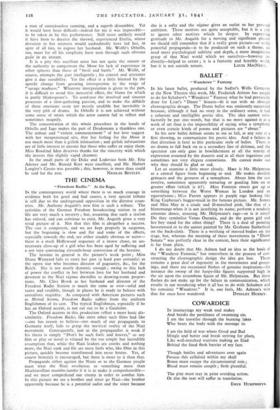THE CINEMA
"Freedom Radio." At the Regal.
IN the contemporary world where there is so much courage in evidence both for good and bad causes, a very special tribute is still due to the underground opposition in the dictator coun- tries. Mr. Anthony Asquith's new film is such a tribute. The activities of the German Freedom broadcasting station in real life are very much a mystery ; but, assuming that such a station has existed, and can continue to exist, Mr. Asquith gives a very vivid picture of it. Not that this film is altogether a success. The cast is competent, and we are kept properly in suspense, but the beginning is slow and flat and some of the effects, especially towards the end, are either crudely obvious or naive— there is a stock Hollywood sequence of a motor chase, an am- necessary close-up of a girl who has been aged by suffering and a not very convincing eleventh-hour conversion of the heroine.
The heroine in general is the picture's weak point ; Miss Diana Wynyard fails to carry her part (a hard part certainly) as the opera star who becomes director of pageantry, &c., for the Reich. She is not nearly dynamic enough ; owing to this lack of power the conflict in her between love for her husband and devotion to the Nazi regime dwindles to drawing-room propor- tions. Mr. Clive Brook as her husband and director of the Freedom Radio Station is much the same as ever—solid and suave and credible, though in places he is made to behave with unrealistic stupidity. As compared with American pictures such as Mortal Storm, Freedom Radio suffers from the uniform- Englishman of its cast. The typical Englishman, especially if he has an Oxford accent, is not cut out to be a Gauleiter.
The Oxford accents in this production reflect a more basic dis- similarity. Freedom Radio, like most other such films tad like —one has reason to believe—too much of our propaganda to Germany itself, fails to grasp the mystical reality of the Nazi movement. Consequently, just as the propagandist is weak if his thesis is simply "Don't be such fools and knaves," so any film or play or novel is vitiated by the too simple but incredible assumption that, while the Nazi leaders are crooks and nothing more, the Nazi rank and file are mere fools who, like Otto in this picture, quickly become transformed into mere brutes. Yes, of course brutality is encouraged, but there is more to it than that.
Propaganda either against the Nazis or to the German people must treat the Nazi revolution as something more than Machiavellian mumbo-jumbo if it is to make it comprehensible— and we must comprehend our enemy in order to combat him. In this picture we see a brother and sister go Nazi—the brother apparently because he is a potential sadist and the sister because
she is a softy and the regime gives an outlet to her personal ambition. These motives are quite acceptable, but it is a pity to ignore other motives which lie deeper. In expressing gratitude to Mr. Asquith for a moving and significant picture we should still remember that if a really great picture—or really powerful propaganda—is to be produced on such a theme, we need more psychological subtlety and depth, a more imaginative grasp of that Nazi world which we ourselves—however in- directly—helped to create ; it is a fantastic and horrible world,






























 Previous page
Previous page